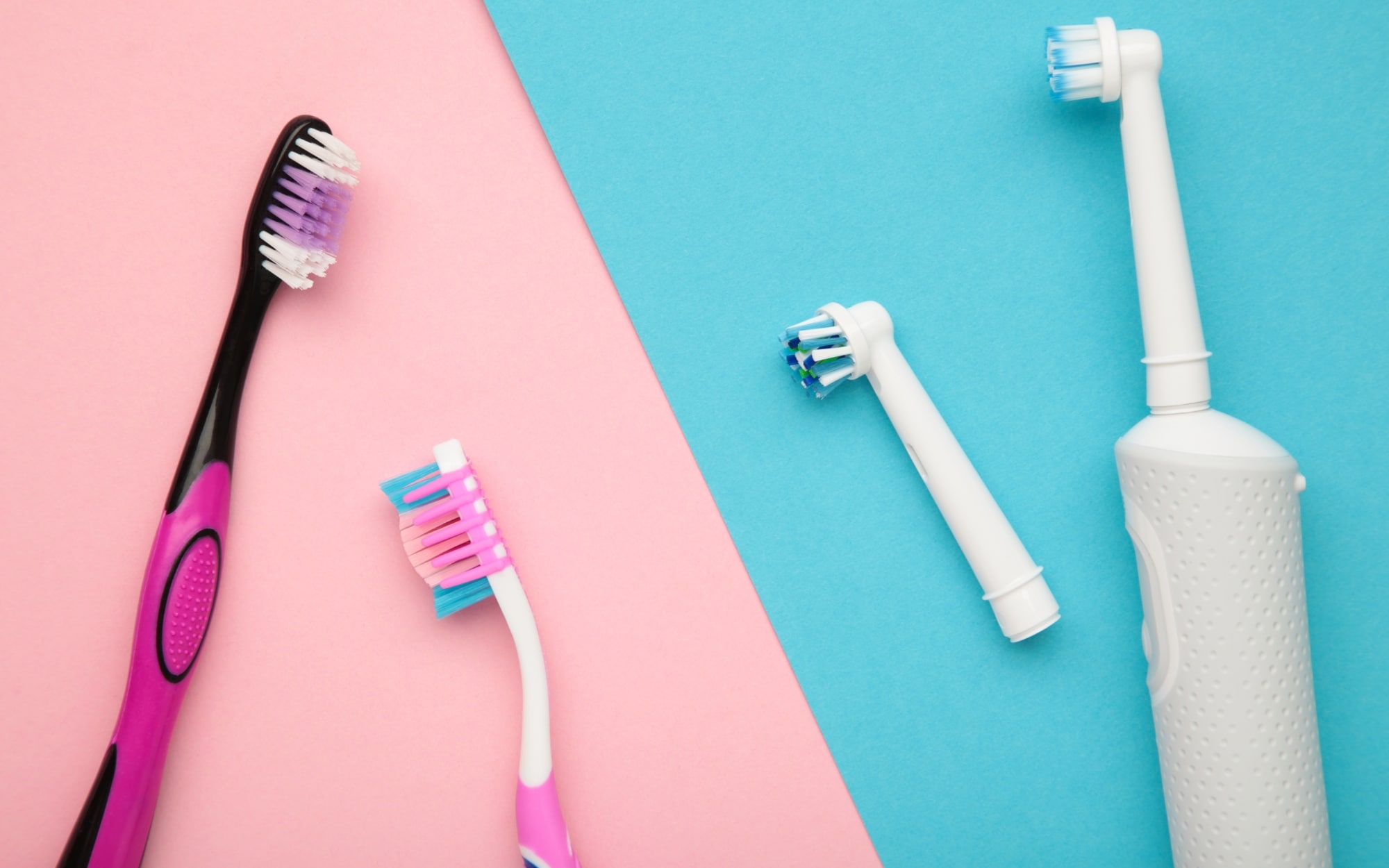ONLINE SCHEDULING AND VIRTUAL CONSULTS AVAILABLE

Electric Toothbrush vs. Manual Toothbrush: What Should You Know?

Choosing the right toothbrush can be as tricky as picking the perfect pair of shoes.
Are you team manual or team electric?
Each type promises a dazzling smile, but they come with their own set of benefits and quirks. Manual toothbrushes are straightforward, reliable, and have been around for ages. They’re like your trusty old jeans—simple and effective.
On the flip side, electric toothbrushes bring a modern twist to your oral care routine, packed with high-tech features designed to elevate your brushing game. They promise efficiency and convenience, like your favorite smart gadget.
But how do they stack up against the classic manual brush?
Is one really better than the other, or does it all come down to personal preference?
Read on to discover what you need to know about both types and make an informed choice for your dental health. Whether you’re loyal to tradition or intrigued by innovation, we’ll help you navigate this brushing battle and find out which brush deserves a spot in your bathroom cabinet.
Manual Toothbrushes: The Classic Choice
Manual toothbrushes have been a staple in dental care for decades. Their basic design includes a handle and bristles arranged in various patterns. This simplicity is their strength.
Pros:
- Affordability: They’re budget-friendly, with no additional costs beyond the initial purchase.
- Ease of Use: No batteries or charging needed—just pick up and brush.
- Control: You can adjust the pressure and technique based on your preference.
Cons:
- Less Efficient: Requires proper brushing technique to effectively remove plaque.
- Manual Effort: Requires more effort and time compared to electric options.
Best For: Ideal for those who prefer simplicity or have a tight budget. They’re also recommended for individuals with dexterity issues, as they offer more control over brushing pressure.
Exploring Electric Toothbrushes: The Modern Marvels
Electric toothbrushes offer a high-tech approach to oral hygiene, with features that go beyond the capabilities of manual brushes.
How They Work:
- Mechanics: Powered by a motor, they oscillate or rotate to enhance brushing efficiency.
- Features: Many come with timers, pressure sensors, and multiple brushing modes.
Pros:
- Superior Cleaning: Proven to remove more plaque and reduce gum inflammation.
- Convenience: Built-in timers ensure you brush for the recommended two minutes.
Cons:
- Cost: Higher initial price and ongoing costs for replacement brush heads.
- Maintenance: Requires charging and occasional battery replacement.
Best For: Those seeking a high-efficiency option or who need extra help with brushing techniques. Also beneficial for individuals with limited hand mobility.
Cleaning Power Showdown: Manual vs. Electric
When it comes to cleaning efficiency, electric toothbrushes often take the lead.
Comparative Studies:
- Plaque Removal: Research shows electric brushes remove more plaque compared to manual brushes.
- Gum Health: They are also better at reducing gum disease due to their consistent brushing action.
Technique Impact:
- Manual Brushes: Effectiveness highly depends on brushing technique and duration.
- Electric Brushes: Less technique-dependent; they provide consistent results with minimal effort.
Recommendations:
- Electric for Efficiency: If you struggle with technique or want the best plaque removal, an electric brush might be ideal.
- Manual for Control: If you prefer a more hands-on approach or have a tight budget, manual brushes can still be effective.
User Experience and Comfort: Finding What Fits
Comfort and usability are key factors in choosing between manual and electric toothbrushes.
Manual Toothbrushes:
- Comfort: Allows precise control, though some may find it requires more effort.
- Ease of Use: Simple and portable, with no noise.
Electric Toothbrushes:
- Comfort: Often comes with ergonomic handles and various brush heads to enhance comfort.
- Noise and Portability: Can be noisy and requires a power source, making them less portable.
Special Needs:
- Children and Disabilities: Electric brushes can make brushing easier for kids and those with disabilities due to less manual effort.
Cost and Maintenance: Weighing the Expenses
Understanding the costs associated with each type of toothbrush can help you make an informed decision.
Initial Cost:
- Manual Brushes: Very affordable, typically costing a few dollars.
- Electric Brushes: Higher upfront cost, depending on features.
Ongoing Costs:
- Manual Brushes: Minimal, only needing occasional replacement every few months.
- Electric Brushes: Includes replacement brush heads and potential battery maintenance.
Longevity:
- Manual: Can last a long time with proper care.
- Electric: Generally durable but may need replacement of parts over time.
Environmental Impact and Sustainability: Making Eco-Friendly Choices
Both toothbrush types have environmental considerations, but there are ways to minimize your impact.
Manual Toothbrushes:
- Plastic Waste: Most are made from plastic, contributing to landfill waste.
- Eco-Friendly Options: Some brands offer bamboo or biodegradable alternatives.
Electric Toothbrushes:
- Electronic Waste: Batteries and electronic components add to e-waste.
- Sustainable Choices: Look for brands that offer recycling programs for old brushes.
Reducing Footprint:
- Proper Disposal: Recycle toothbrushes when possible and choose sustainable options.
Personal Preferences and Recommendations: Choosing What Works for You
Selecting the right toothbrush involves more than just comparing features.
Factors to Consider:
- Dental Needs: Consult with your dentist near you about what might work best for your specific oral health needs.
- Lifestyle and Budget: Consider your lifestyle, brushing habits, and budget.
Final Thoughts:
- Both Options Have Merits: Whether you opt for a manual or electric toothbrush, both can offer effective oral care when used properly.
- Expert Recommendations: For personalized advice, speak with your dentist to find the best option tailored to your needs.
Choosing between an electric and manual toothbrush ultimately depends on your personal needs and preferences. While electric toothbrushes offer advanced features and ease of use, manual brushes are budget-friendly and simple. Both can provide effective oral care when used correctly. Consider your lifestyle, dental needs, and budget as you make your choice. For tailored advice, consult with your dentist to find the toothbrush that best suits your unique needs and helps you maintain optimal dental health.


